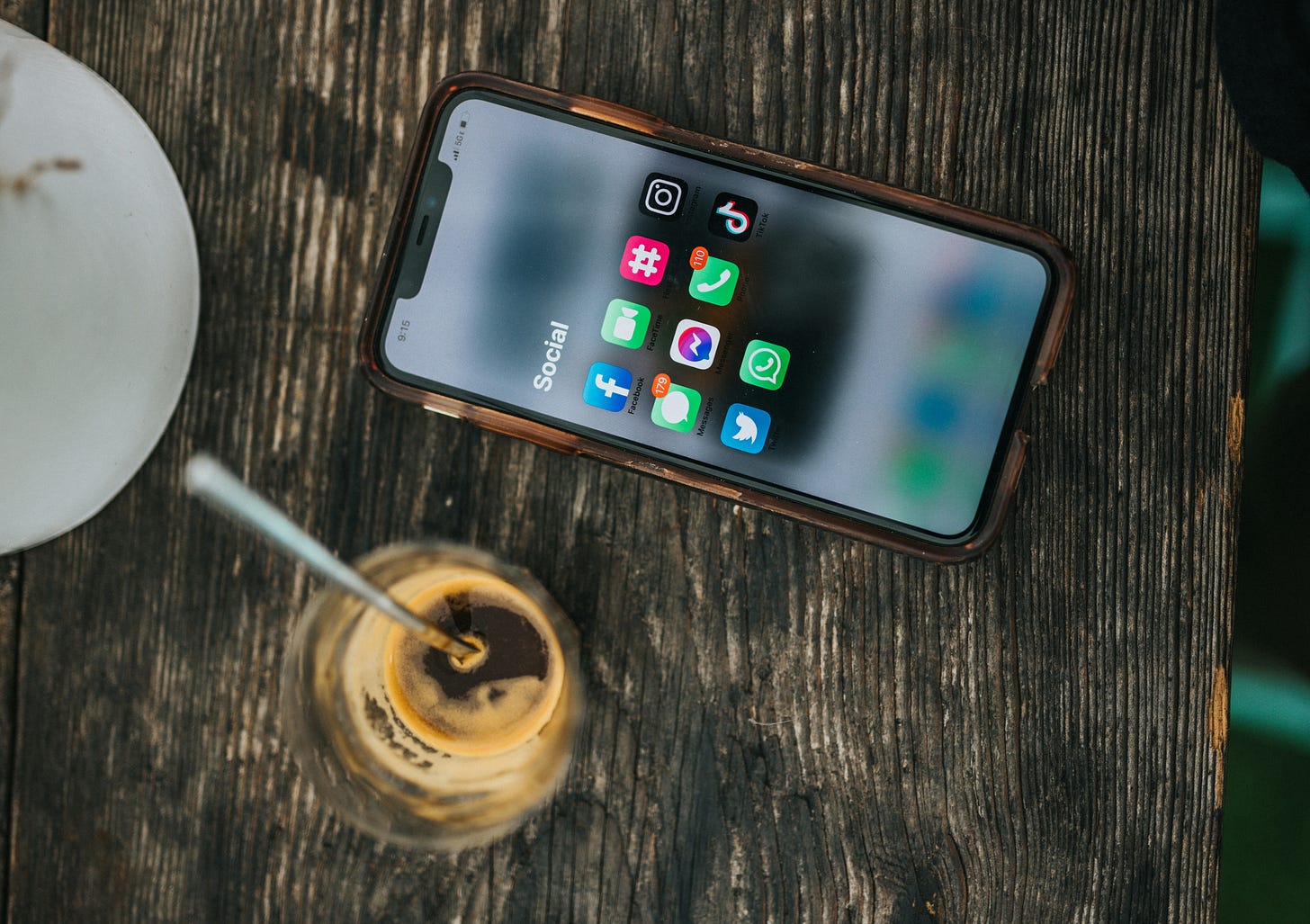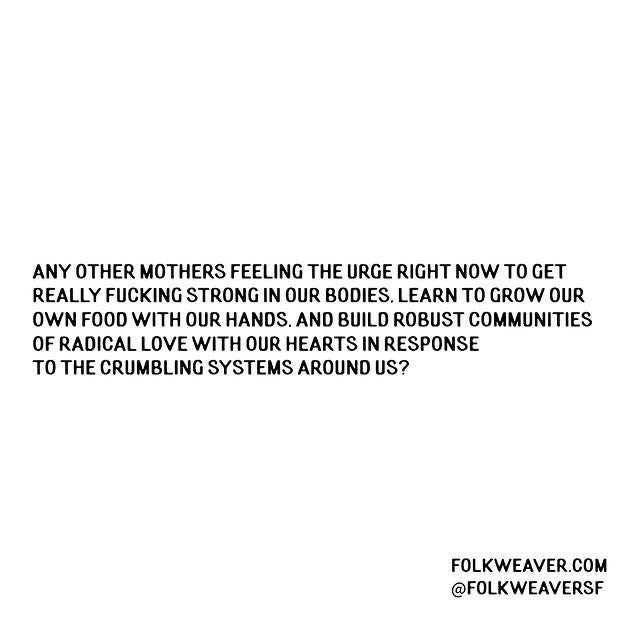Can the adults handle social media?
Stop panicking about young people and worry about corporations instead.
If you enjoy my writing, please consider supporting me. (I have a monthly book club as a perk for paid members, where we read & chat about parenting, unschooling, education, mothering and carework. Find out more here.)
For a while now I’ve been thinking of social media, and really any form of technology, like this: it’s a tool to enable me to do the thing I want, but it’s not the thing I want.

I was scrolling my Notes app and saw this phrase written down - perhaps as a stray thought I had, or perhaps as something someone else said or wrote and I quickly jotted down, forgetting to credit them. (If it’s the latter, pls comment below!)
Whatever it is, this is how I feel: I don’t enjoy it anymore, it’s not where I want to be, and yet I need it because it’s how I keep in touch with some of my closest people, how I find out about events, petitions, movements, and a variety of other things, it’s how I access some of my information and news, it’s how I reach people if I happen to ever wish to reach people again (debatable).
Amidst all of the talk about banning phones and restricting social media for young people, there is a gaping hole and it is this: I’m not sure any of us can actually handle it. I’m not sure it’s what any of us should be considering an okay place to hang out, an end in itself. And even when we decide it’s a tool, is it actually? Because if you asked Meta whether we are the users or whether it is using us, I fear it may say it’s using us.
Whenever people start to worry about how the next thing will affect the youth, I immediately ask myself, are the adults okay though? And so much of the time, we are not.
So much of the time, the moral panic says more about us than it says about the harms children are experiencing.
I don’t mean to diminish the real harm that online spaces can do to young people. And, I also don’t think the media and parenting ‘experts’ are really engaging with young people enough and finding out what they get out of these spaces.
But this post is not about that: it’s fundamentally about the hypocrisy at the core of our current moral panics.
We are up in arms that young people are protesting violently, when instead we should be reflecting on the kind of world we have created for them, and why they feel so strongly that things need to be changed.
We are concerned social media is damaging children’s mental health, when in fact companies like Meta are overwhelmingly targeting us, the adults, as well as skirting responsibility for making their platforms safe and disinformation-free spaces for everyone.
We have forgotten that adults have always panicked about something or someone corrupting the youth: in the 1950s in the US it was comic books, during my teens I remember widespread adult concern around violent video games which still exist but seem to be a non-issue with today’s parents. Almost every new piece of media has engendered a moral panic, from Shakespeare to the printing press to television to Dungeons and Dragons.
Does this mean that every new technology is absolutely okay? No, not at all. But I think where we go wrong is that we tend to direct our anxiety towards young people’s engagement with the new technology, and in the process frame it as the reason for their behaviours or trends that we aren’t able to find comprehensive, causal explanations for. In other words, it becomes a scapegoat for what are probably much more complex, systemic issues.
This is not only very simplistic, but also completely lets us, the adults, off the hook. Because as someone who used to spend quite a bit of time on social media, I don’t think it’s doing many of us any good. In fact, I hazard to say that perhaps we are deflecting our own discomfort with it so as not to have to face it, and conveniently placing it on a group of people who don’t typically get much of a voice in society, and who are routinely misunderstood.
There are several studies now that look at both positive and negative impacts of social media in adults, especially older adults that have been neglected in the research, which has tended to focus more on children and young adults. It bears repeating that all of the research we do have is not causal - in other words we cannot establish that social media use causes anything at all, just that there are associations for some people. .
On a purely subjective level, I can aknowledge the multiple realities of social media at once. Being on there is not bad or good - it’s many things all at once.
I’ve had so many experiences while in online spaces: I’ve learned things, I’ve connected with others, I’ve expanded and challenged my views and engaged in really interesting dialogue. I’ve felt encouraged and validated. I’ve found ways to express myself. And, I have also experienced the unique anxiety that comes from being very online, and the ways it has impacted my day to day life, my mental health, my sense of being able to live my actual life, my sense of connection to a physical place and people. I’ve seen the downside of some of these spaces, the polarisation, the performativity, the keyboard warrior-ness of it all. Some of us might be able to hold all of this at once, but I am not. The difficult and problematic ended up outweighing the fun and constructive, at least in this moment.
My bigger point is that platforms like X and Meta and Tik Tok need to be held accountable for their censorship, spreading of misinformation and toxic messaging, and the ways they essentially use us to make money. A lot of the research assumes it is the duty of families and individuals to regulate our usage and take care of our own health, and while we do have agency there it shouldn’t solely be our responsibility. Some families and people will inevitably have greater barriers to being able to manage online time, recognise false information and have the tools to stay safe and well online.
Why should I have to choose between knowing what people I connect with are upto, and feeling well? Because as of right now, I can’t really do one without compromising the other.
I will never be able to unsee the fact that I am social media platforms’ product. Every time I log in, I am being consumed - my data is being captured and sold, my every like and share memorised. This should be worrying to us all, adults and children. No matter how many times I say social media is a tool, the reality is that I am just as much of a tool for social media platforms!
I am loathe to talk about our children’s experiences online without actually talking to children and young people. That should always be Step One, in my opinion.
And so on that note, how are YOU experiencing online time lately? Are you on any social media and how does that feel? Is Substack any better?! If you have left social media, how is that feeling for you?
Thank you for reading, as always!
Fran x
A few resources on this topic that I have found useful.






I booted social media from my phone. The only way I allow myself to get on it is on my laptop. I log in once every couple of weeks to check notifications and messages. I made my phone look boring to help me remember it is merely a tool. Now I don’t use it as often as I was before.
I left FB years ago and left IG a few weeks ago. Each time life was drastically better. The way FB affected me was less drama in my personal life and soul. IG was a much better platform for me at the time. But it changed so much over the years I feel like I’m not actually in control of my algorithm like I used to be. (Or my perception of control) I finally gave it up because I knew it was wasting my time, causing me to spend more money, and adding to stress. I read so much more now and often don’t even know where I left my phone in the house.